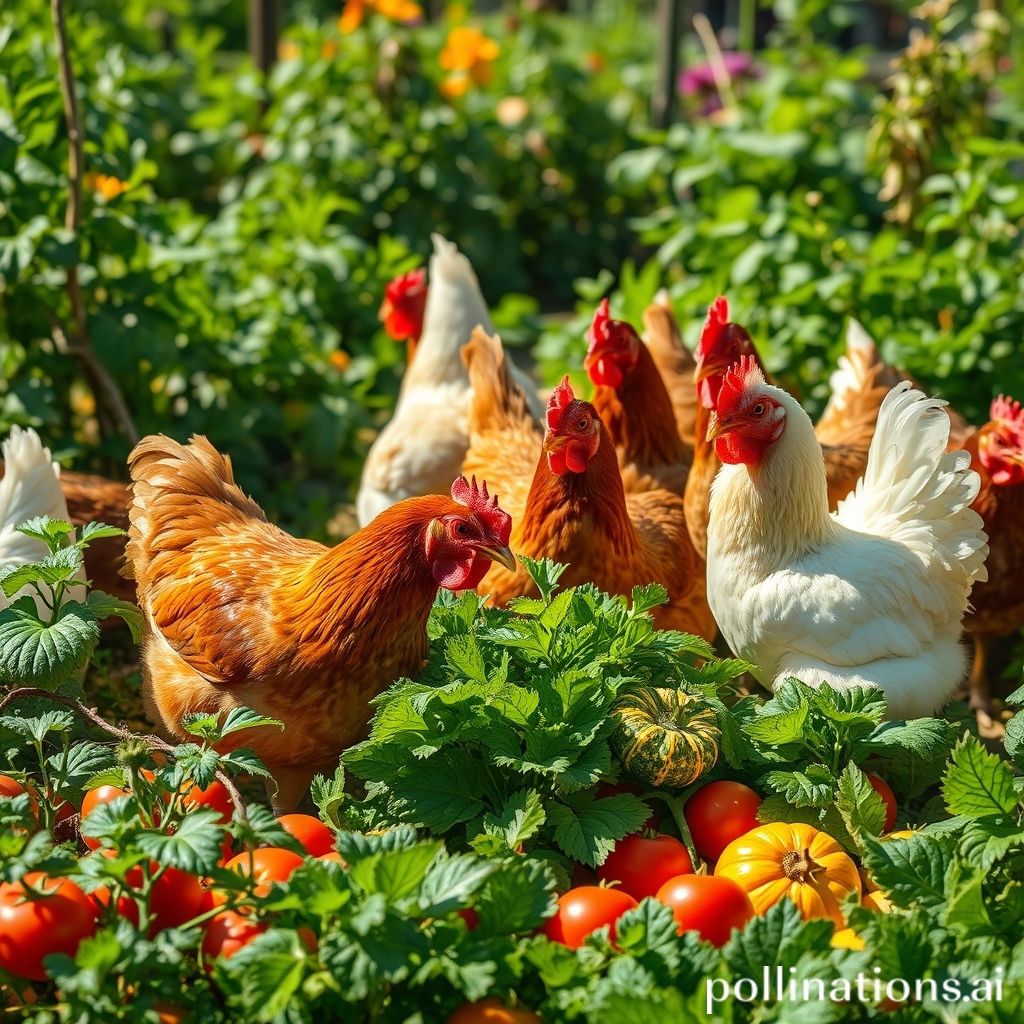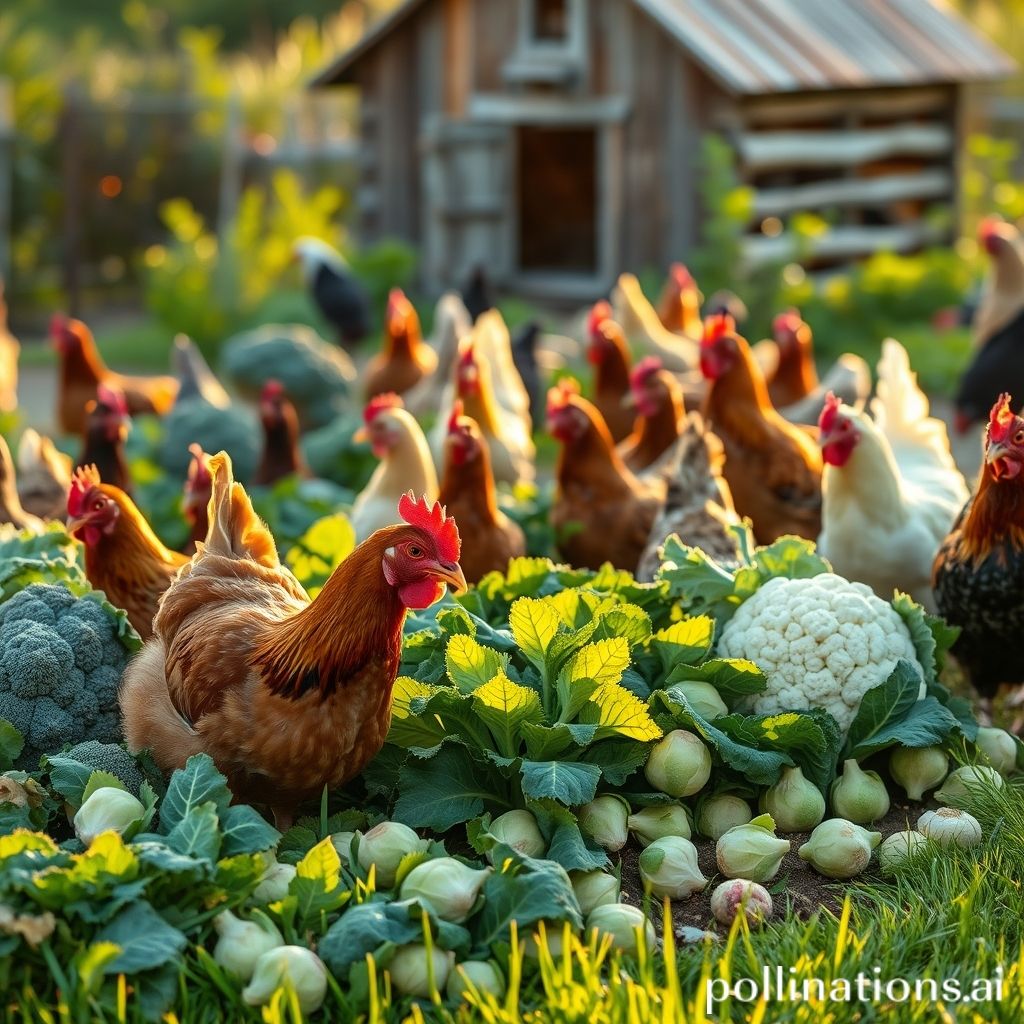There’s nothing quite like watching your chickens enjoy their favorite snacks. Chickens can eat a variety of vegetables that not only provide them with essential nutrients but also make for a tasty treat.
From leafy greens like spinach and kale to crunchy carrots and cucumbers, these garden delights are sure to delight your flock. But which vegetables are safe for chickens to eat? And are there any vegetables that should be avoided? In this #FlockStrong article, we explore the world of chicken-friendly vegetables and help you create a well-rounded diet for your feathered friends. Let’s dive into the world of veggie treats for chickens!
Chicken Veggies Fruit Skewers Lettuce String Bag Hanger
Enhance Your Chicken’s Playtime
Leafy Greens
Leafy greens are an important part of a chicken’s diet, providing many benefits that contribute to their overall well-being and health.
1. Benefits of Leafy Greens for Chickens
Leafy greens give chickens essential nutrients, vitamins, and minerals that support their growth and immune system. They have antioxidants like vitamin A and C, which strengthen their immune system and protect against diseases. Leafy greens are also high in dietary fiber, which aids digestion and promotes a healthy gut.
Furthermore, these greens have high levels of calcium, which are necessary for eggshell formation in laying hens. Calcium deficiencies can lead to thin or weak shells, increasing the risk of egg breakage. By including leafy greens in their diet, chickens can ensure the production of strong and healthy eggs.
2. Examples of Safe Leafy Greens for Chickens
When choosing safe leafy greens for chickens, it’s important to consider their nutritional value and potential toxicity. Here are some examples of leafy greens that are safe and suitable for chickens:
| Leafy Greens | Benefits for Chickens |
|---|---|
| Spinach | Rich in iron and vitamin K, promotes blood clotting and overall health. |
| Kale | Excellent source of vitamins A and C, supports immune system function. |
| Swiss Chard | High in magnesium, helps regulate blood pressure and supports bone health. |
| Dandelion Greens | Contains antioxidants and supports liver health. |
These leafy greens can be given to chickens in raw or cooked form, but it’s recommended to introduce new foods gradually and in moderation to avoid digestive upset. Additionally, it’s important to thoroughly wash leafy greens to remove any potential pesticides or contaminants.

Root Vegetables
Root vegetables not only add deliciousness to human diets but also offer several nutritional benefits for chickens. Including root vegetables in a chicken’s diet ensures that they receive essential vitamins, minerals, and fiber. Let’s take a closer look at the nutritional value of root vegetables for chickens:
1. Nutritional value of root vegetables for chickens
Root vegetables provide a range of nutrients that contribute to the overall health of chickens. Some key nutritional benefits include:
- Vitamins: Root vegetables are rich in vitamins, including vitamin A, vitamin C, and various B vitamins. These vitamins support healthy growth, immune function, and feather development in chickens.
- Minerals: Root vegetables contain minerals such as potassium, calcium, and magnesium. These minerals are essential for bone strength, nerve function, and eggshell production in chickens.
- Fiber: The high fiber content in root vegetables aids in digestion and promotes a healthy gut environment for chickens.
- Antioxidants: Some root vegetables contain antioxidants that help protect chickens’ cells from damage caused by free radicals, reducing the risk of diseases.
2. Popular root vegetables that chickens can eat
When selecting root vegetables for chickens, there are numerous safe and suitable options to consider. Some popular root vegetables that chickens can enjoy include:
| Root Vegetable | Nutritional Benefits |
|---|---|
| Carrots | High in beta-carotene, which is converted to vitamin A in chickens. Carrots help improve eyesight and boost the immune system. |
| Beets | Rich in nutrients like folate, manganese, and iron, which contribute to overall health and energy levels in chickens. |
| Parsnips | Provide vitamins C and K, as well as dietary fiber. Parsnips support immune function and aid in digestion. |
| Sweet Potatoes | Contain antioxidants, vitamins A and C, and fiber. Sweet potatoes promote healthy skin, feathers, and a strong immune system in chickens. |
| Turnips | Rich in vitamins, minerals, and fiber. Turnips help maintain a healthy weight and provide energy for chickens. |
Gradually introduce root vegetables into a chicken’s diet and provide them in small, manageable portions. Also, ensure that the vegetables are fresh, thoroughly washed, and free from any harmful pesticides or chemicals.
Cruciferous Vegetables
Cruciferous vegetables are not only good for humans, but they also play an important role in a chicken’s diet. These vegetables provide essential nutrients that contribute to the overall health and well-being of chickens.
1. How Cruciferous Vegetables Help Chickens
Cruciferous vegetables:
- Are packed with vitamins and minerals, including vitamin C, vitamin K, and calcium, which are needed for strong bones and a healthy immune system.
- Contain antioxidants that protect chickens from harmful free radicals and support their overall health.
- Provide dietary fiber that aids digestion and promotes a healthy gut.
- Are a good source of phytochemicals, such as glucosinolates, which may have anti-cancer properties in chickens.
2. List of Safe Cruciferous Vegetables for Chickens
When feeding chickens, it’s important to offer a varied diet that includes a selection of safe cruciferous vegetables. Here is a list of cruciferous vegetables that chickens can safely eat:
| Vegetable | Benefits |
|---|---|
| Broccoli: | High in vitamins C and K, as well as dietary fiber. |
| Cauliflower: | Rich in antioxidants and a good source of vitamin C. |
| Cabbage: | Provides vitamins C and K, along with beneficial phytochemicals. |
| Kale: | Packed with vitamins, minerals, and antioxidants. |
| Brussels sprouts: | Contain essential nutrients and antioxidants. |
Remember to introduce new vegetables gradually and in moderation to avoid digestive problems. Also, make sure the vegetables are fresh and free from pesticides or chemicals.

Squash and Gourds
1. The Benefits of Squash and Gourds for Chickens
Squash and gourds are highly nutritious and offer various health benefits to chickens. These vegetables provide essential vitamins, minerals, and fiber, supporting the overall well-being of chickens.
1.1 The Nutritional Value of Squash and Gourds for Chickens
Squash and gourds are rich in vitamins A, C, and K, which are crucial for supporting chickens’ immune system, bone health, and digestion. These vegetables also contain minerals like potassium and magnesium, which help maintain the chickens’ electrolyte balance and muscle function.
1.2 The Health Benefits of Squash and Gourds for Chickens
Consuming squash and gourds can improve egg quality and production in chickens. The antioxidants found in these vegetables protect the chickens’ cells from oxidative damage and support their reproductive health.
2. Varieties of Squash and Gourds Suitable for Chickens
Chickens can safely eat a variety of squash and gourds, adding flavor and nutrition to their diet.
2.1 Acorn Squash
Acorn squash is a popular choice for chickens as it is rich in vitamin C, fiber, and potassium. It can be served cooked or raw, depending on the chickens’ preferences.
2.2 Butternut Squash
Butternut squash is another excellent option for chickens. It is packed with vitamins A and C, as well as dietary fiber. Cooked butternut squash can be easily mashed or cubed for the chickens to enjoy.
2.3 Pumpkin
Pumpkin is a favorite treat for chickens, especially during the fall season. It contains high levels of vitamin A, which supports their vision and immune system. Chickens can eat both the flesh and seeds of a pumpkin.
2.4 Zucchini
Zucchini is a versatile vegetable that can be fed to chickens either raw or cooked. It is low in calories and offers vitamins B6 and C, as well as dietary fiber.
| Vegetable | Nutritional Benefits |
|---|---|
| Acorn squash | Rich in vitamin C, fiber, and potassium |
| Butternut squash | Packed with vitamins A and C, and dietary fiber |
| Pumpkin | High levels of vitamin A and immune support |
| Zucchini | Low in calories, vitamins B6 and C, and dietary fiber |
Fruits
When considering a chicken’s diet, fruits are crucial for providing necessary nutrients and promoting overall health. In this article, we will explore the importance of fruits in a chicken’s diet and highlight some safe and beneficial options for them to enjoy.
1. Significance of fruits in a chicken’s diet
Fruits offer a wide range of essential vitamins, minerals, and antioxidants that contribute to a chicken’s well-being. Including fruits in their diet can boost their immune system, aid digestion, and support growth and development. Additionally, the natural sugars found in fruits provide chickens with a quick energy boost.
2. Safe and beneficial fruits for chickens to enjoy
By providing chickens with a variety of fruits, you not only diversify their diet but also ensure they receive a variety of nutrients. Here are some safe and beneficial fruits that chickens can enjoy:
a. Apples
Apples are an excellent source of vitamins A and C, as well as dietary fiber. Chop them into small pieces and offer them as a tasty treat to your chickens.
b. Berries
Strawberries, blueberries, and raspberries are rich in antioxidants and can be a flavorful snack for chickens. Remember to remove any stems or leaves before feeding them.
c. Watermelon
Watermelon is not only refreshing but also provides hydration for chickens. Remove the seeds and cut the fruit into small pieces for easy consumption.
d. Bananas
Chickens can benefit from the nutritional value of bananas, which are high in potassium and vitamin B6. Mash or slice the bananas before offering them to your flock.
Conclusion
Chickens can safely consume a variety of vegetables as part of their diet. These include leafy greens like spinach and kale, as well as crunchy options like carrots and cucumbers.
Vegetables not only provide essential nutrients but also offer enrichment and entertainment for chickens. In contrast, it is important to introduce new vegetables gradually to avoid digestive issues and monitor any potential allergies. Consulting with a veterinarian or poultry expert can help ensure the health and well-being of your feathered friends. Through assimilation a diverse range of vegetables, you can contribute to the overall vitality and happiness of your flock.
Frequently Asked Questions about Feeding Chickens
FAQ 1: Can chickens eat tomatoes?
Yes, chickens can eat tomatoes. Tomatoes are safe for chickens to consume in moderation. Although, it’s important to note that the leaves and stems of tomato plants are toxic to chickens, so only feed them the ripe fruit.FAQ 2: Are potatoes safe for chickens to eat?
No, chickens should not eat raw potatoes. Raw potatoes contain solanine, a toxin that can be harmful to chickens. Although, cooked potatoes are safe for chickens to eat as long as they are plain and not seasoned with any harmful ingredients.FAQ 3: Can chickens eat broccoli leaves?
Yes, chickens can eat broccoli leaves. Broccoli leaves are a nutritious addition to a chicken’s diet. They provide essential vitamins and minerals, promoting good health for your chickens.FAQ 4: Are onions harmful to chickens?
Yes, onions are harmful to chickens. Onions contain thiosulphate, a compound that can be toxic to chickens and can lead to anemia. It’s best to avoid feeding onions to your chickens to ensure their well-being.FAQ 5: Can chickens eat citrus fruits?
Yes, chickens can eat citrus fruits, but it should be in moderation. Citrus fruits like oranges, lemons, and grapefruits are safe for chickens to consume. Although, the high acidity of these fruits can cause digestive issues if given in excessive amounts. It’s recommended to provide small portions of citrus fruits as occasional treats.Read Similar Post:
1. How Much To Feed Chickens?
2. How Many Nesting Boxes For 20 Chickens?

